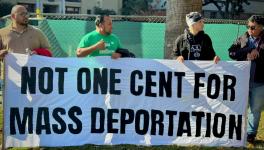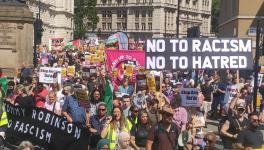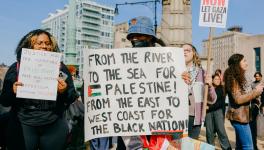A History of Lynching
Dr. Lawrence Brown tells guest host Janaya Khan that recent police shootings of unarmed black men remind him of the 4000 lynchings between 1877 and 1950, the murder of Emmett Till, and bombings of black churches.
Janaya is a guest host at the Real News Network and a co-founder of Black Lives Matter Toronto. Known as future within the BLM movement, khan is a Black, queer, gender-nonconforming activist, staunch Afrofuturist, boxer, and social-justice educator. Their writings have been featured in The Feminist Wire, RaceBaitR, The Root, and Huffington Post Black Voices.
Transcript
JANAYA KHAN, TRNN: Welcome to the Real News Network. I'm Janaya Khan.
If you've been watching the news, if you've been having conversations around the dinner table, what you've heard and what you've seen in the world with Black Lives Matter having uprisings across the States, with five police officers in Dallas who were recently shot and Obama's speech on that, I think we're all wondering, what's next?
Joining me right now is Dr. Lawrence Brown, an activist, local health consultant, and assistant professor of public health at Morgan State University. How are you doing, Mr. Brown?
LAWRENCE BROWN: I'm doing all right overall. Thank you.
KHAN: What do you make of what's been happening across the globe? I myself am feeling like we're in this moment of incredible despair, it's tumultuous, and also an incredible amount of hope. Where is this landing for you?
BROWN: Well, I mean, there's the personal side of it, where in many ways a lot of this is very traumatic. I mean, you have a situation where these videos come out over and over again, every year. You can almost anticipate it now here in America. And it still hits you as maybe the very first time. I mean, it's just the sense of brutality that are in some of these videos.
And what happens, I think, here in America there is a history of lynching. Of 4,000-plus lynchings between 1877 and 1950, according to the Equal Justice Initiative. And so, you know, some of these videos make me feel like, here we go again. It takes me back to Emmett Till. It takes me back to the four little girls in Alabama who were bombed in the church, 16th Street Baptist Church.
And so globally, I think, it's really inspiring to see how Black Lives Matter and the movement for black lives has really sort of expanded to reach places like Canada and the UK, and to learn that protests are breaking out there, too, is really amazing. I think in America we don't realize, we aren't really taught in our schools, about the African diaspora population across the world. And you realize that, you know, in places like Brazil there's a tremendous amount of police violence. And so people are taking up, African people around the world, people that are considering taking up the call of Black Lives Matter, because globally white supremacy is negating and dehumanizing black people.
So I think it's really an exciting time. It bodes well for sort of a global sense of solidarity across the diaspora. But personally, it can be very, very tough.
KHAN: I'm someone who's not from the United States. I'm from the bitter stepchild in the North. That's what Canada is. And so a lot of time and energy is spent sort of focusing on the U.S. And in so many ways, the treatment of black people in the U.S. is still considered the moral compass of the world. And so oftentimes the first thing that's said in Canada when you challenge racism is, but we're not as bad as the States. And now we have several chapters that are in Canada.
And having been to London, and--you know, even seeing South Africa. When Ferguson happened we had hashtags that were coming out that were saying, you know, from Ferguson to Palestine, and you had Palestinans who were discussing how to neutralize tear gas. And just recently in Israel we saw a whole group of people shutting down a road, saying black lives matter.
So what does that mean for the international implications, and do you feel that the solidarity that's being shown around the world, do you feel like within the Black Lives Matter movement internationally, where we are really paying attention to what's happening here in the States, is that same solidarity shown to other organizers and other protest movements that are not necessarily state-based?
BROWN: Well, I think it's interesting that you said Canada's considered the stepchild to America, but I think America, in America we view ourselves as exceptional. So you don't spend, I think, the amount of time looking globally and providing solidarity globally to other movements who, and other people, who are facing many of the same issues that we are. I do find it interesting that many black activists, for instance, they just had the DNC Platform where they expressed solidarity with the Palestinians, which is wonderful, but I didn't see a statement expressing--well, they tried to express solidarity with the Palestinians. It was voted down. But there was no attempt to sort of express solidarity with the African population in Israel that's also going through the refugee population, and people of African descent in Israel that are also experiencing a large level of apartheid and repression by the state there, meaning being deported to places like Uganda.
So it is, I think, in America we--it's interesting. Black activists, I think, sometimes overlook other movements around the globe that actually share many of our same aims. I think at some part you can base that on the severe lack of education, the poor education, that we receive about the type of histories and struggle that many of our brothers and sisters share around the world.
KHAN: There's something that I think you brought up that's really important: this idea of exceptionalism. And I think the perfect example of that is Obama. In yesterday's speech he sort of spoke to his own experience, and how there's still this idea that if you work hard enough, and if you commit to this type of American belief system, this dream that you can overcome, and that you can incite certain types of change that we can create an equal society, one that is founded on exploitation, on anti-black racism, on indigenous genocide, what do you make of that?
BROWN: Well, I think, you know, President Obama tries to view his story as one as, that provides proof for the forward movement, the forward-thinking inclination of America. But I think his personal biography belies the type of forward motion, the black progress, and then the white backlash that's actually a more accurate description of what we actually have in America. You can have black progress coming out of enslavement, 13th, 14th, and 15th Amendments which abolish slavery, provide citizenship, and provide black men with the right to vote. But then after those reconstruction amendments have a white backlash in terms of white redemption that helps violently break down black reconstruction, and then the rise of the Ku Klux Klan and the white sort of terrorism, white supremacist terrorism, that pushes down the black progress that moves forward.
In the '60s you can have the black civil rights movement and the Black Power movements here in the United States that move the ball forward, but then you can have the backlash of the war on drugs, Reaganomics, and the sort of really squelching of--and COINTELPRO, which helps assassinate many of our leaders, here. So that's actually more of a true indicator of who America is. Black progress, one step forward, white backlash, two steps back. And I think that's what his analysis tends to miss. We're not really as forward moving as he believes. He misses those attempts and movements of white backlash.
KHAN: That was really dope. That was like--I like, like, really powerful one-liners, and that was in the sort of one step forward, two steps back. Because the backlash--we often hold up and esteem these moments, these wins. And we don't really take into consideration the backlash and the sort of, the rollbacks that happen as a result. So if we're now allowed to vote, what are other ways that we can inhibit people's abilities to vote? And we're looking at the expansion of the prison-industrial complex, and using people who have had previous experiences of being charged eliminating their ability to vote. And we have that type of criminalization that's happening in our communities. That's a huge part of our population that can't actually access the vote to begin with.
Around goals--because, you know, if you're looking at a place like Canada the framework is totally different, the population is very different. And the ideology behind black liberation is one that's very pan-African. Because the histories are so different. But one thing that I've seen very consistently is the call for reparations in the past. I'm not seeing that as strongly in this movement, in this iteration of our Black Power movement, now. What is the role of reparations in seeing our goals through?
BROWN: Well, that's a very interesting question. I think reparations in many ways provides a way of acknowledging the pain that has been caused. You know, I think America needs to go through a process to arrive at reparations. First, there does need to be the acknowledgment that there were 389,000 Africans shipped from the coast of Africa, brought to the United States. There were 1.2 million people of African descent that were shipped to the deep South from the Chesapeake region, Delaware, Virginia, Maryland, and a more Northern area in the United States, to the deep South as cotton production was taking off.
The acknowledgment of that white supremacist violence I mentioned earlier with the Ku Klux Klan, the White Knights, and other terrorist groups that were in existence at the time, the acknowledgment of the 4,000-plus lynchings of Jim Crow, the new Jim Crow.
So there has to be the acknowledgment first that we have done this to Native Americans. The tremendous land grabs, the infiltration of culture, and the genocidal violence that was enacted and exacted against them. So America has to acknowledge these things, first. Then figure out, I think, actually starting with Native Americans, because this is their land, this is their soil, how do we begin to decolonize, and then to the people of African descent, how do we begin to provide reparations for that which was done? So I think America has to grow up, and have a sort of moral awakening to, in order to say, we have done these things, we acknowledge it, we apologize, and now we're going to begin the process of mending the--and repairing what we've done, the damage that we've caused.
So I think reparations would be tremendous. Now, is America serious, or at anywhere close to doing that? Absolutely not. America's nowhere close to that. And I think that's the truth. It may never get there. I don't know that America is a place where we can have hope in the future. I think America is a global empire. We are 900-plus military installations around the world, and we're falling apart due to the violence that we have internally. We have more guns than we have people. We have 13,000 homicides every year. We have damage that we're doing around the world. We're Rome on a global level, and our contradictions are going to cause us to fall.
So I think maybe the question for people of African descent is, how can we build a base globally, and hopefully in solidarity with our people on the continent of Africa, so that we can move forward even as this construct falls apart.
KHAN: Yeah, I think that's really profound. I've seen in different political education platforms the idea for a resurgence of black infrastructure. And I think that the potential in that is extraordinary. You know, it's why we have one of the chance, you know, you'll hear so much on the ground, know that we will win. And we have to keep naming this as a possibility, as a reality. I want to thank you for joining us in this conversation and being here at the Real News, and sort of bringing your expertise to the table.
You've been here with myself, Janaya Khan, and Dr. Lawrence Brown, and we've been talking about the implications of black liberation and what it could look like in the future. Thank you for joining us here at the Real News in Baltimore.
Biography
Dr. Lawrence Brown is an activist, global health consultant, and Assistant Professor of Public Health at Morgan State University. He studies the role of racism, masculinity, and disinvested neighborhoods with regard to their impact on health. His research explores the intersection between history and public health.
End
DISCLAIMER: Please note that transcripts for The Real News Network are typed from a recording of the program. TRNN cannot guarantee their complete accuracy.
Get the latest reports & analysis with people's perspective on Protests, movements & deep analytical videos, discussions of the current affairs in your Telegram app. Subscribe to NewsClick's Telegram channel & get Real-Time updates on stories, as they get published on our website.
























